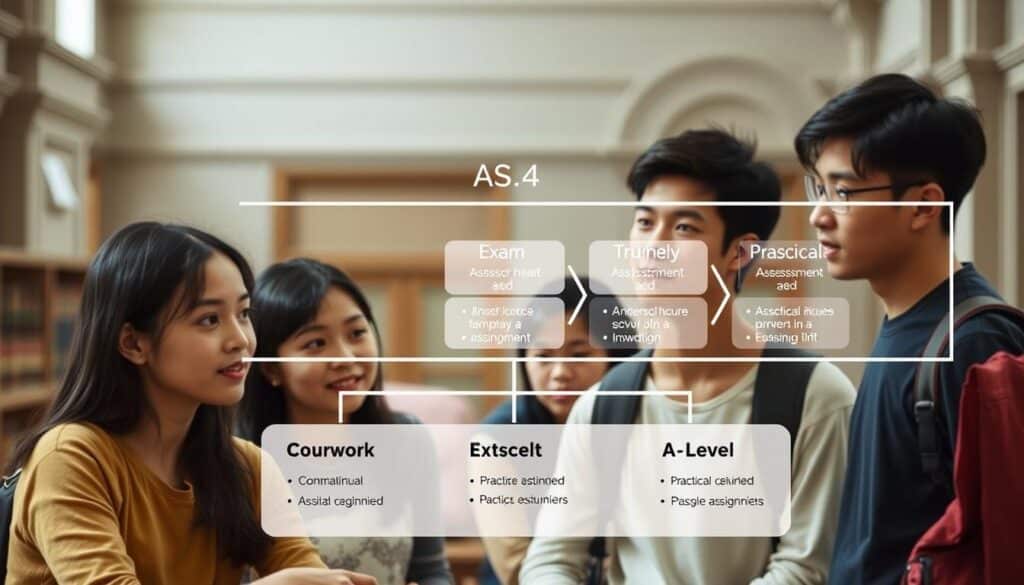Did you know that over 500,000 students worldwide take A Level exams each year? These qualifications are a critical step for students aiming to enter top universities. The AS and A Level system, offered by Cambridge and other examination boards, is a two-part challenge that demands a strong foundation in your chosen subjects and a strategic approach to exams.
Success in these advanced qualifications requires more than just studying. Students must master both the AS (Advanced Subsidiary) exams in their first year and the A2 exams in their second year. Understanding the assessment formats—such as written exams and internal assessments—is key to building confidence. At Getutor, we specialize in matching students with experienced tutors who provide personalized support, helping you overcome challenges and achieve your academic goals.
Many students struggle with common mistakes like cramming and poor time management. Our tutors help you avoid these pitfalls by creating tailored study plans and reinforcing core concepts. With a deep understanding of the curriculum and exam techniques, we empower students to excel in their chosen subjects.
Key Takeaways
- A Levels are a two-year qualification split into AS and A2 levels.
- Understanding exam formats boosts confidence and performance.
- Getutor offers free tutor matching for personalized learning support.
- Common mistakes like cramming can hinder success.
- A strong study plan and understanding of the curriculum are essential.
Understanding AS and A Level Qualifications
AS and A Level qualifications hold a significant place in the global education system, offering students a pathway to top universities. Originating in the UK, these qualifications have evolved to become a benchmark for academic excellence worldwide.
Overview of the Structure and History
The AS (Advanced Subsidiary) and A Level system was introduced in 1951 in England and Wales. Initially designed as a single exam, it later split into AS and A2 levels in 2000 to provide a more structured approach. The AS level serves as the foundation, typically taken in the first year, while the A2 builds on it in the second year, offering in-depth study.
This two-part structure allows students to demonstrate their understanding progressively. The AS contributes 40% to the final A Level grade, with the A2 making up the remaining 60%. This setup helps students manage their workload and showcase their growth over two years.
Key Components and Assessment Formats
A Levels are offered in a wide range of subjects, from sciences and mathematics to languages, arts, and business. Each subject has its assessment method, blending written exams with internal assessments to evaluate both theoretical knowledge and practical skills.
Written exams typically account for 70% of the marks, focusing on comprehensive understanding. Internal assessments, making up the remaining 30%, may include projects, presentations, or practical work, providing a holistic evaluation of a student’s abilities.
For instance, in sciences like biology or chemistry, internal assessments might involve lab work, while in subjects like English literature, they could include essays or presentations. This mix ensures that students develop both analytical and practical skills.
Understanding the curriculum and structure is vital for success. Students should focus on building a strong foundation in their chosen subjects and effectively manage their time between exams and assessments. At Getutor, we guide students through this journey, helping them excel and achieve their academic goals.
- AS Level contributes 40% to the final A Level grade.
- A Levels are split into AS and A2, each with distinct assessments.
- Written exams and internal assessments are used to evaluate students.
- Understanding the structure is key to achieving desirable grades.
By grasping the components and assessments, students can approach their studies strategically, ensuring they are well-prepared for their exams and future academic pursuits.
Mastering as and a level: Tips and Strategies
Success in AS and A Level exams requires a strategic approach. Students need to adopt effective study techniques and prepare thoroughly for exams. At Getutor, we guide students through this journey with proven strategies tailored to their needs.
Effective Study Techniques and Resources
One of the most effective ways to prepare is by solving past exam papers. This helps students get familiar with exam formats and question types. For instance, A Level Business exams include multiple-choice questions, short answers, and essays. Summarizing class notes into detailed outlines supports quick revision and retention.
Digital recordings of lessons can reinforce learning during commutes or downtime. These resources are especially helpful for subjects like English Language, where mastering language frameworks is crucial for exam performance.
Exam Preparation and Practical Tips
| Technique | Description | Benefit |
|---|---|---|
| Solving Past Papers | Familiarizes students with exam formats and question types. | Improves time management and understanding of exam structure. |
| Summarizing Notes | Creates concise study materials for quick revision. | Enhances retention and reduces study time. |
| Digital Recordings | Reinforces learning through audio reviews. | Supports learning on-the-go, especially for complex subjects. |
Building a study schedule aligned with the curriculum helps balance subjects and maintain progress. Seeking clarifications from teachers and discussing topics in study groups also enhances understanding. Remember, consistent practice and a positive attitude are key to achieving academic success.
Identifying Common Struggles and How to Overcome Them
Identifying common struggles in AS and A Level exams can be the first step toward achieving academic success. Many students face challenges such as poor time management and unclear understanding of exam requirements, which can hinder their performance.
Common Pitfalls in AS and A Level Exams
One of the most significant challenges is balancing multiple subjects while keeping up with coursework and assessments. Students often find it difficult to manage their time effectively, leading to cramming and increased stress levels.
Another common issue is inadequate revision strategies. Without a structured study plan, students may struggle to retain information, resulting in lower grades and unnecessary stress.
| Pitfall | Description | Solution |
|---|---|---|
| Poor Time Management | Students often struggle with balancing study and leisure time. | Tailored study plans and regular breaks can improve focus. |
| Unclear Exam Requirements | Misunderstanding exam formats can lead to poor performance. | Practicing past papers and seeking tutor guidance clarifies expectations. |
| Inadequate Revision Strategies | ineffective revision methods result in lower retention. | Using summaries and digital recordings enhances study efficiency. |
Overcoming these challenges is not just about studying harder, but studying smarter.
Leveraging Private Tutoring with Getutor for Success
Private tutoring can provide personalized strategies and study plans, helping students overcome specific weaknesses. Getutor offers a free matching service, connecting students with expert tutors who specialize in advanced level subjects.
With professional guidance, students can adjust their study habits and achieve improved exam results. Parents can rest assured that their investment in a private tutor is a effective way to support their child’s academic progress.
Conclusion
Mastering AS and A Level qualifications is a key milestone for students aiming to excel in international education. These advanced level exams, offered by Cambridge and other boards, provide a pathway to top universities worldwide. Understanding the structure and history of these qualifications is crucial for success.
Effective study techniques, such as solving past papers and summarizing notes, can significantly improve exam performance. Additionally, avoiding common mistakes like poor time management and unclear exam requirements is essential. Getutor’s expert tutors specialize in these advanced level subjects, offering personalized support to overcome challenges.
Parents and students are encouraged to take proactive steps by leveraging professional tutoring services. Getutor’s free matching service connects students with experienced tutors, ensuring tailored study plans and improved academic results. Don’t wait—act now to secure a brighter academic future.
FAQ
What is the difference between AS and A Level qualifications?
AS (Advanced Subsidiary) and A Level (Advanced Level) are both part of the Cambridge International curriculum. AS is typically taken in the first year, while A Level is taken in the second year. AS is a standalone qualification but can also contribute to the final A Level grade.
How are AS and A Level subjects assessed?
Assessments include exams, coursework, and practicals, depending on the subject. For example, science subjects may include practical exams, while art and design focus more on coursework. The final grade is based on performance across all units.
What are the core subjects offered at AS and A Level?
Core subjects include mathematics, english language, economics, history, business studies, and design technology. Students can also choose from a wide range of optional subjects like art, music, and international languages.
How long does it take to complete an AS or A Level?
AS Level typically takes one academic year to complete, while A Level takes two years. Students usually take AS exams at the end of the first year and A Level exams at the end of the second year.
What are the benefits of taking AS and A Level qualifications?
AS and A Levels are internationally recognized and highly valued by universities worldwide. They emphasize critical thinking, independent study, and advanced skills, making students well-prepared for higher education and professional careers.
Can students take a combination of AS and A Level subjects?
Yes, students often take a mix of AS and A Level subjects. For example, they might take AS in mathematics and A Level in economics. This flexibility allows students to explore their interests and strengths while meeting university entry requirements.
How are AS and A Level grades calculated?
Grades are calculated based on performance in exams, coursework, and practical assessments. The final grade is awarded on a scale from A* (highest) to E (lowest). AS Level grades are separate but can contribute to the A Level result.
What support is available for students struggling with AS or A Level subjects?
Students can benefit from private tutoring, study groups, and additional resources like past exam papers and online study guides. Schools also offer guidance to help students manage their workload and prepare effectively for exams.
Are AS and A Level qualifications recognized internationally?
Yes, AS and A Levels are recognized by universities and employers worldwide. They are particularly valued in the UK, the US, Canada, Australia, and other countries for their academic rigor and global standard.





